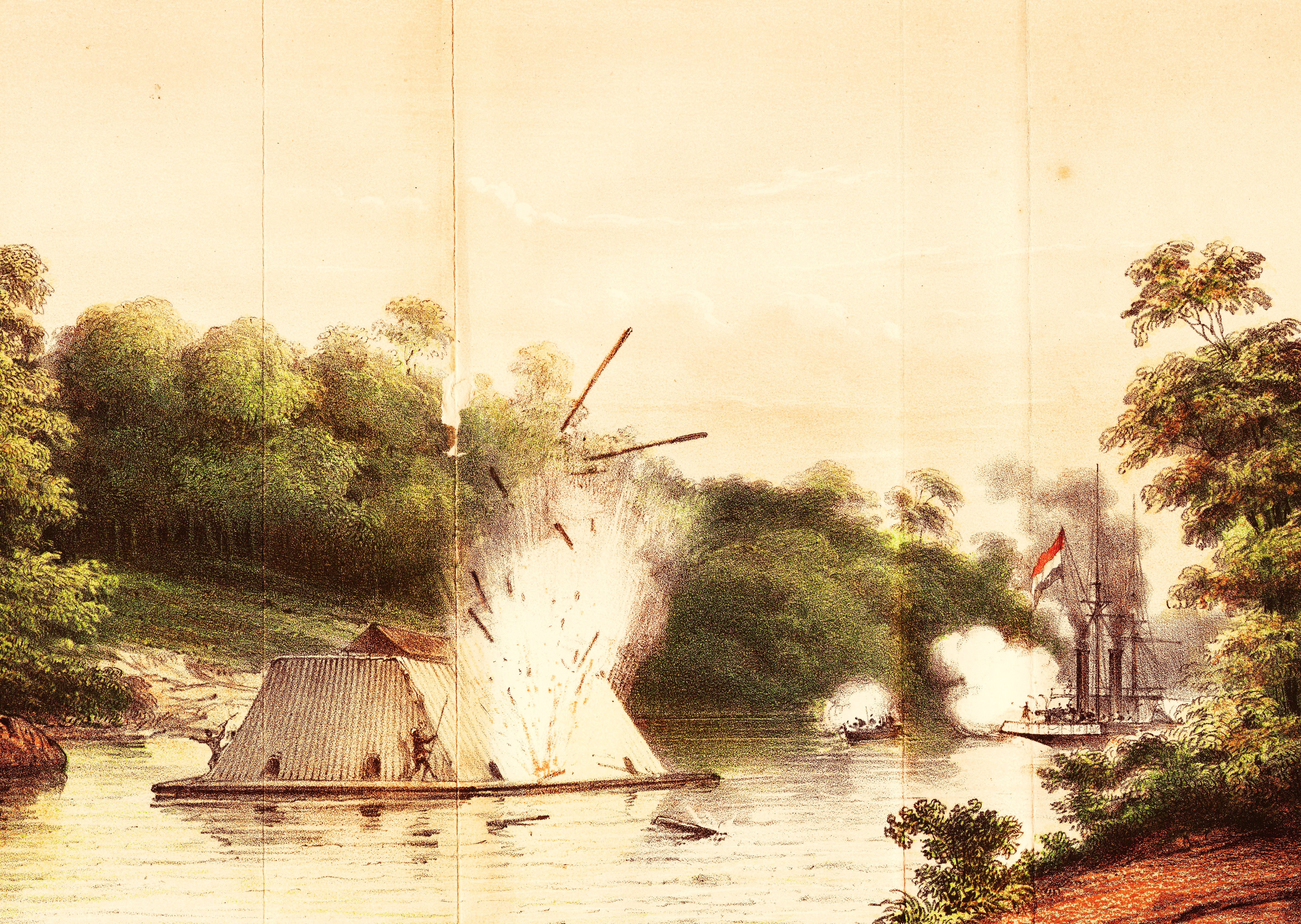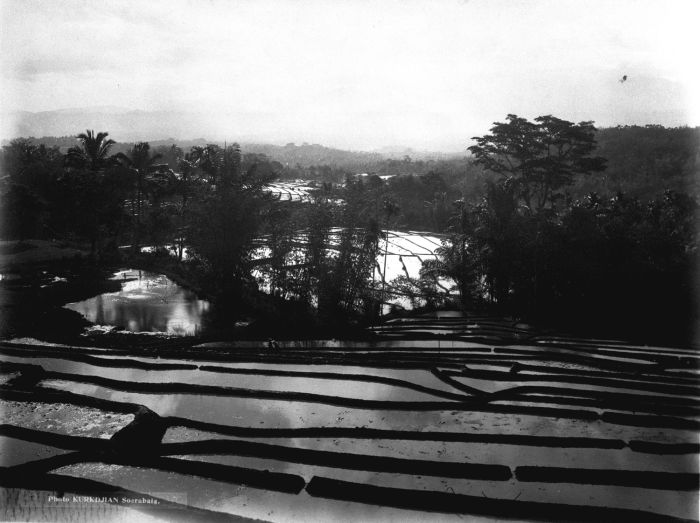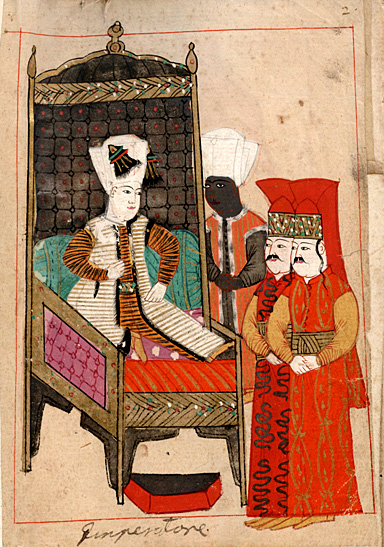|
Hidayatullah II Of Banjar
Sultan Hidayatullah II of Banjar, known also as Pangeran Hidayatullah, Sultan Hidayat or simply Hidayat (born in Martapura, South Kalimantan, 1822, died in Cianjur, Jawa Barat, 24 November 1904), was a sultan-pretender of the Sultanate of Banjar and a leader of the Banjarese rebels in the Banjarmasin War. Personal life Pangeran Hidayatullah was born in 1822 in Martapura. His father was Sultan Muda Abdurrahman son of Sultan Adam Al-Watsiq Billah, and his mother was Ratu Siti binti Pangeran Mangku Bumi Nata bin Sultan Sulaiman. In 1852 the Sultan's heir-apparent died, and the Dutch replaced him by the illegitimate grandson Tamjied Illah. In vain, Sultan Adam and many nobles in 1853 sent an embassy to Batavia, pointing out iniquities perpetrated by the Dutch-designated heir and appealing for the Dutch to recognise instead Hidayatullah - a younger but legitimate son. Sultan Adam died in 1857 and was succeeded by Tamjied Illah. There ensued a struggle for power between Tamjied Illa ... [...More Info...] [...Related Items...] OR: [Wikipedia] [Google] [Baidu] |
Martapura, South Kalimantan
Martapura is the capital of the Banjar Regency in South Kalimantan province, Indonesia. It is located close to the city of Banjarbaru (with which it forms a continuous built-up area) and it consists of three Districts of Indonesia, districts within the Regency - Martapura (district), Martapura, West Martapura and East Martapura, with a combined population at the 2010 Census of 147,654 people. Originally this town was named "Kayutangi", which was the last capital of the former Sultanate of Banjar. The famous Banjar people, Banjarese ulema Sheikh Muhammad Arsyad al-Banjari, author of Sabilal Muhtadin, comes from this town. This town is famous as ''kota santri'' or the "city of ''santri'' (Muslim students)" in Kalimantan, because of the ''pesantren'' (Islamic boarding school) of Pondok Pesantren Darussalam Martapura. Martapura is often called "Veranda of Mecca" because there are many santris wearing white clothes in this town who walk up and down to study Islam, similar to Mecca ... [...More Info...] [...Related Items...] OR: [Wikipedia] [Google] [Baidu] |
Cianjur Regency
Cianjur Regency is a Regency (Indonesia), regency ''(kabupaten)'' of West Java, Indonesia. The area of the regency is 3,614.35 km2 and its population at the 2010 Census was 2,171,281; the 2020 Census produced a total of 2,477,560 and the official estimate as at mid 2021 was 2,506,682. The town of Cianjur is its capital. Northern parts of the regency form a valley (above the 'neck'), and are far more densely populated than southern regions. As such, a portion of the northern valley (consisting of Cugenang, Pacet, Sukaresmi and Cipanas districts in the far northwest of the regency) was briefly included in a definition of Greater Jakarta called ''Jabodetabekjur'' (''jur'' for Cianjur). Administrative divisions Cianjur Regency is divided into thirty-two Districts of Indonesia, districts (''kecamatan''), listed below with their areas and their populations at the 2010 and 2020 Censuses, together with the official estimates as at mid 2021. The table also includes the location of the ... [...More Info...] [...Related Items...] OR: [Wikipedia] [Google] [Baidu] |
Sultanate Of Banjar
Sultanate of Banjar or Sultanate of Banjarmasin ( Banjar: كسلطانن بنجر, Kasultanan Banjar) was a sultanate located in what is today the South Kalimantan Province of Indonesia. For most of its history, its capital was at Banjarmasin. History The second king of Negara Daha, Maharaja Sukarama had four commoner wives, and four sons and one daughter. As Maharaja Sukarama followed the traditional belief of Negara Dipa requiring the king had to be of royal blood, arranged marriage of his sole daughter, Putri Galuh Baranakan and the son of his brother, Raden Bagawan, with the name Raden Mantri. The result this union (of Mantri and Galuh) will produce the ideal heir to rule Daha as they would have patrilineal and matrilineal royal blood. This union result in Raden Samudra who was prepared by Sukarama to rule. However after Sukarama's death this succesion was challenged by his sons, Pangeran Mangkubumi dan Pangeran Tumanggung who usurped the throne. Raden Samudra, escap ... [...More Info...] [...Related Items...] OR: [Wikipedia] [Google] [Baidu] |
Banjarmasin War
The Banjarmasin War (in old spelling ''Bandjermasin War'', Dutch: ''Bandjermasinse Oorlog'', or formally ''Expeditie naar de Zuider- en Oosterafdeling van Borneo'') (1859–1863) was a war of succession in the Sultanate of Banjarmasin, as well as a colonial war for the restoration of Dutch authority in the eastern and southern section of Borneo. Background 17th century Since 1606 the East United India Company maintained contacts with the island of Borneo. In 1635 the first contract was signed with the Sultanate of Banjarmasin for the provision of pepper - at the time, a luxury product in Europe and a major reason for the Dutch interest in this region. In following decades there were several skirmishes and armed clashes, especially related to such pepper contracts being unfulfilled. One of the most serious was the 1638 killing of 64 Dutch and 21 of their Japanese partners, at Kota Waring in Bandjermasin. Early 19th century In 1809 Herman Willem Daendels, then governor o ... [...More Info...] [...Related Items...] OR: [Wikipedia] [Google] [Baidu] |
Cianjur
Cianjur ( su, ᮎᮤᮃᮔ᮪ᮏᮥᮁ) is a town and district in the West Java province of Indonesia, and is the seat of Cianjur Regency. The district of Cianjur is located along one of the main roads between Jakarta (120 km to the northwest) and Bandung (60 km to the east). The population was 158,125 at the 2010 Census and 173,265 at the 2020 Census; the official estimate as at mid 2021 was 174,587.Badan Pusat Statistik, Jakarta, 2022. Because of its location, some of Cianjur's residents commute to work either in Bandung or in Jakarta. The road on which Cianjur is located used to be the main (extremely busy) road from Jakarta to Bandung but was in effect replaced as the main road link between these two main cities when the Jakarta-Bandung tollroad was fully completed in 2005. However, due to its low traffic, Cianjur returned as one of the alternative routes for travellers from Jakarta and Bandung. History Cianjur was founded in 1677, with the first head of the town ... [...More Info...] [...Related Items...] OR: [Wikipedia] [Google] [Baidu] |
Jawa Barat
West Java ( id, Jawa Barat, su, ᮏᮝ ᮊᮥᮜᮧᮔ᮪, romanized ''Jawa Kulon'') is a province of Indonesia on the western part of the island of Java, with its provincial capital in Bandung. West Java is bordered by the province of Banten and the country's capital region of Jakarta to the west, the Java Sea to the north, the province of Central Java to the east and the Indian Ocean to the south. With Banten, this province is the native homeland of the Sundanese people, the second-largest ethnic group in Indonesia. West Java was one of the first eight provinces of Indonesia formed following the country's independence proclamation and was later legally re-established on 14 July 1950. In 1966, the city of Jakarta was split off from West Java as a 'special capital region' (), with a status equivalent to that of a province, while in 2000 the western parts of the province were in turn split away to form a separate Banten province. Even following these split-offs, West Java is ... [...More Info...] [...Related Items...] OR: [Wikipedia] [Google] [Baidu] |
Sultan Muda Abdurrahman Of Banjar
Sultan (; ar, سلطان ', ) is a position with several historical meanings. Originally, it was an Arabic abstract noun meaning "strength", "authority", "rulership", derived from the verbal noun ', meaning "authority" or "power". Later, it came to be used as the title of certain rulers who claimed almost full sovereignty (i.e., not having dependence on any higher ruler) without claiming the overall caliphate, or to refer to a powerful governor of a province within the caliphate. The adjectival form of the word is "sultanic", and the state and territories ruled by a sultan, as well as his office, are referred to as a sultanate ( '. The term is distinct from king ( '), despite both referring to a sovereign ruler. The use of "sultan" is restricted to Muslim countries, where the title carries religious significance, contrasting the more secular ''king'', which is used in both Muslim and non-Muslim countries. Brunei and Oman are the only independent countries which retain the tit ... [...More Info...] [...Related Items...] OR: [Wikipedia] [Google] [Baidu] |
Sultan Adam Of Banjar
Sultan (; ar, سلطان ', ) is a position with several historical meanings. Originally, it was an Arabic abstract noun meaning "strength", "authority", "rulership", derived from the verbal noun ', meaning "authority" or "power". Later, it came to be used as the title of certain rulers who claimed almost full sovereignty (i.e., not having dependence on any higher ruler) without claiming the overall caliphate, or to refer to a powerful governor of a province within the caliphate. The adjectival form of the word is "sultanic", and the state and territories ruled by a sultan, as well as his office, are referred to as a sultanate ( '. The term is distinct from king ( '), despite both referring to a sovereign ruler. The use of "sultan" is restricted to Muslim countries, where the title carries religious significance, contrasting the more secular ''king'', which is used in both Muslim and non-Muslim countries. Brunei and Oman are the only independent countries which retain the t ... [...More Info...] [...Related Items...] OR: [Wikipedia] [Google] [Baidu] |
Sultan Sulaiman Of Banjar
Sultan (; ar, سلطان ', ) is a position with several historical meanings. Originally, it was an Arabic abstract noun meaning "strength", "authority", "rulership", derived from the verbal noun ', meaning "authority" or "power". Later, it came to be used as the title of certain rulers who claimed almost full sovereignty (i.e., not having dependence on any higher ruler) without claiming the overall caliphate, or to refer to a powerful governor of a province within the caliphate. The adjectival form of the word is "sultanic", and the state and territories ruled by a sultan, as well as his office, are referred to as a sultanate ( '. The term is distinct from king ( '), despite both referring to a sovereign ruler. The use of "sultan" is restricted to Muslim countries, where the title carries religious significance, contrasting the more secular ''king'', which is used in both Muslim and non-Muslim countries. Brunei and Oman are the only independent countries which retain the t ... [...More Info...] [...Related Items...] OR: [Wikipedia] [Google] [Baidu] |
Royal Netherlands East Indies Army
The Royal Netherlands East Indies Army ( nl, Koninklijk Nederlands Indisch Leger; KNIL, ) was the military force maintained by the Kingdom of the Netherlands in its colony of the Dutch East Indies, in areas that are now part of Indonesia. The KNIL's air arm was the Royal Netherlands East Indies Army Air Force. Elements of the Royal Netherlands Navy and Government Navy were also stationed in the Netherlands East Indies. History 1814–1942 The KNIL was formed by royal decree on 14 September 1814. It was not part of the Royal Netherlands Army, but a separate military arm specifically formed for service in the Netherlands East Indies. Its establishment coincided with the Dutch drive to expand colonial rule from the 17th century area of control to the far larger territories constituting the Dutch East Indies seventy years later. The KNIL was involved in many campaigns against indigenous groups in the area including the Padri War (1821–1845), the Java War (1825–1830), crushin ... [...More Info...] [...Related Items...] OR: [Wikipedia] [Google] [Baidu] |
Egbert Broer Kielstra
Egbert is a name that derives from old Germanic words meaning "bright edge", such as that of a blade. Anglo-Saxon variant spellings include Ecgberht () and Ecgbert. German variant spellings include Ekbert and Ecbert. People with the first name Middle Ages * Ecgberht of Kent, king of Kent (ruled 664–673) * Egbert or Ecgberht of Ripon (died 729), Anglo-Saxon saint, monk and Bishop of Lindisfarne * Egbert or Ecgbert of York (died 766), Archbishop of York * Ecgberht II of Kent (died c. 784), king of Kent * Egbert of Lindisfarne (died 821), Bishop of Lindisfarne * Egbert of Wessex, king of Wessex (ruled 802–839) * Ecgberht I of Northumbria, king of Northumbria (deposed 872; died 873) * Ecgberht II of Northumbria, king of Northumbria (ruled c. 876–883) * Egbert (archbishop of Trier) (c. 950–993) * Egbert of Liège (), educator and author * Egbert I, Margrave of Meissen (d. 1068) * Egbert II, Margrave of Meissen (c. 1060–1090) Later times * Egbert Bakker (born 1958), Dutch ... [...More Info...] [...Related Items...] OR: [Wikipedia] [Google] [Baidu] |
Wolter Robert Van Hoëvell
Wolter is a given name and surname of Low German and Low Franconian origin. It is equivalent to the English Walter, High German Walther, Dutch Wouter and French Gauthier. People with the name Wolter include: Given name * Wolter von Plettenberg (c. 1450–1535), leader of the Teutonic knights * Gerhard Wolter Molanus (1633–1722), Lutheran theologian and abbot * Wolter Robert van Hoëvell (1812–1879), Dutch minister, politician, reformer, and writer * Koenraad Wolter Swart (1916–1992), Dutch-American historian * Robert Wolter Monginsidi (1925–1949), Indonesian independence fighter * Wolter Wierbos (born 1957), Dutch jazz trombonist * Wolter Kroes (born 1968), Dutch pop singer Surname * Adolph Wolter (1903–1980), German-born American sculptor * Bernard C. Wolter (1852–1936), American politician * Birthe Wolter (born 1981), German actress * Charlotte Wolter (1834–1897), German actress * Franz-Erich Wolter, German computer scientist * Hans Wolter (1911–1978), Germa ... [...More Info...] [...Related Items...] OR: [Wikipedia] [Google] [Baidu] |







